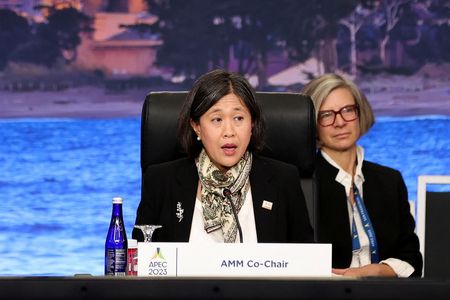By David Lawder
WASHINGTON (Reuters) -The U.S. must take “decisive” action to protect electric vehicles (EVs) from subsidized Chinese competition, U.S. Trade Representative Katherine Tai said on Wednesday as she completes a review of Trump-era China tariffs and considers President Joe Biden’s call for higher tariffs on imports of Chinese steel.
Tai told a U.S. Senate Finance Committee hearing that the U.S. needed to create a level playing field for U.S. workers and that Biden’s call for higher “Section 301” tariffs on Chinese steel imports means that “we are in very, very advanced stages of our interagency work, and I expect that we will come to conclusion very soon.”
She said that China’s “anti-competitive practices,” including “enormous amounts of state support,” had fostered overproduction of solar panels a decade ago that devastated U.S. producers.
Tai said the U.S. was now facing a similar situation with EVs and the automotive sector, and leaving Chinese competition unchecked would cause the U.S. to lose the ability to produce those products.
“So we have to take early action, decisive action and we have to be really clear about why we’re taking the action,” she said. “We are looking for a level playing field because the current playing field is not level, for all the talk about free trade.”
Tai added that the current dynamics in the global EV industry is a significant factor in the Biden administration’s examination of its trade tools.
USTR announced on Wednesday that it had opened a new unfair trade practices investigation into China’s “acts, policies and practices” to dominate the maritime, logistics and shipbuilding sectors.
The probe, which accepts a petition from five U.S. labor unions, will be conducted under Section 301 of the Trade Act of 1974, the same statute used by former President Donald Trump to impose tariffs on hundreds of billions of dollars of Chinese imports in 2018.
Some senators have urged Tai to use the Section 301 tariff review, launched in September 2022, to take actions to impose higher tariffs on Chinese-made EVs.
Tai told the panel that the completion of the review and any adjustments would be presented as a “complete package” and that she had a high degree of confidence it would be completed soon.
(Reporting by David Lawder; Editing by Franklin Paul and Paul Simao)





